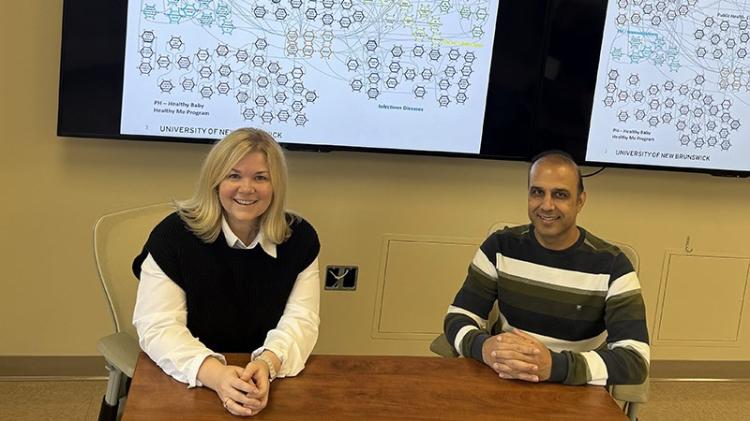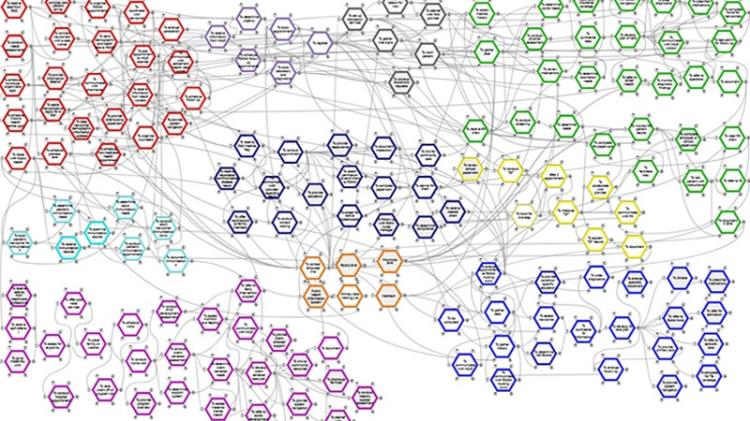The newest recipient of the University of New Brunswick's (UNB) Purdy Crawford/Stephen Jarislowsky Postdoctoral Fellowship in Health Policy isn't a nurse, or a nursing graduate.
In fact, Dr. Vahid Salehi is an industrial and systems engineer.

So how did he end up in UNB's faculty of nursing?
Dr. Ali McGill, an assistant professor of nursing at UNB and Salehi's fellowship supervisor, is the piece that connects the dots.
"Vahid and I shared the same supervisors and conducted research together in our PhD programs at Memorial University," said McGill. "Although my professional background is in nursing, the interdisciplinary PhD I completed was situated primarily in the field of systems engineering, where I gained an expertise in the mapping, modelling and analysis of complex healthcare processes and systems."
"We realized that with our different backgrounds and shared interests in improving healthcare access and delivery, we could build a strong, synergistic research program."
Prior to coming to UNB, Salehi was a postdoctoral fellow in the faculty of engineering and applied science at the Memorial University of Newfoundland, and a postdoctoral fellow with the Eastern Health regional health authority in Newfoundland and Labrador.
He has authored more than 40 peer-reviewed publications, and his research has centred on modelling, analyzing and improving socio-technical systems. In particular, he has focused his attention on modelling healthcare systems, visualizing care and improving the overall quality of care by applying human factor principles and methods.
"UNB offers a unique opportunity to build on my existing expertise in health systems management," says Salehi. "I was drawn to UNB because of its this fellowship collaborative environment. UNB's multidisciplinary approach aligns perfectly with my goal to bridge systems engineering with healthcare delivery and policy development."
McGill's research activities at UNB brought her to the Fredericton Downtown Community Health Centre, a UNB-led partnership with the Horizon Health Network that provides medical services to a number of diverse populations. It was here, working with the Multicultural Association of Fredericton, that the project was born.
In March, McGill was awarded funding support from the Province of New Brunswick's Department of Post-Secondary Education, Training and Labour to conduct an analysis of newcomer care access and health system navigation in Fredericton. Now, with the additional support offered by Salehi's postdoctoral fellowship, the two researchers will be able to expand their study to include Saint John and Moncton, New Brunswick's two other major cities and additional primary settlement hubs for newcomers.
McGill has previously used a research methodology known as FRAM, or Functional Resonance Analysis Method. FRAM is a relatively new research framework for creating a whole-system, non-linear visual model of how work is done in complex systems; researchers use it to create a representation of the interconnected tasks and activities involved in a process.

McGill and Salehi will use FRAM to explore the ways healthcare is accessed by, delivered to and received by newcomers in New Brunswick.
"We can use FRAM to describe the dynamics within a process or system by studying the connections and interdependencies between the activities of work, known as functions," says Salehi.
"These functions are carried out continuously in the healthcare system and can be human, organizational or technological. An examination of the interactions and interdependencies between these functions can provide valuable insight about how a system or process works."
FRAM supports an overall approach known as systems thinking,' a methodology that considers how processes work by looking at all the component parts and the relationships between them.
When looking at healthcare access through this lens, those parts would include everything from gathering the information needed to determine how to access care to arranging travel, visiting a clinic, making an appointment for bloodwork through central scheduling and much more.
"By using this technique, we can create a better understanding of the complexities of healthcare delivery by considering how the multiple factors involved operate and impact one another, which can help how we manage people, organizations, policies and processes," said McGill.
"We can also visually demonstrate to decision makers the complexity of the processes and systems at play and help validate and reflect the lived understandings of healthcare workers. Because we also used interviews to gather information," McGill explained, "we can integrate the perspectives and experiences of newcomers in our recommendations on policies and processes."
McGill started the initial, Fredericton-based data collection in May of this year. During that process, the importance of incorporating the other two cities into the research. Stemming from this increase in project scope and size, Salehi was brought onboard, starting his fellowship in October.
The researchers anticipate the initial, PETL-funded project to be completed early next year, and the broader, three-city project finished by spring of 2026.













